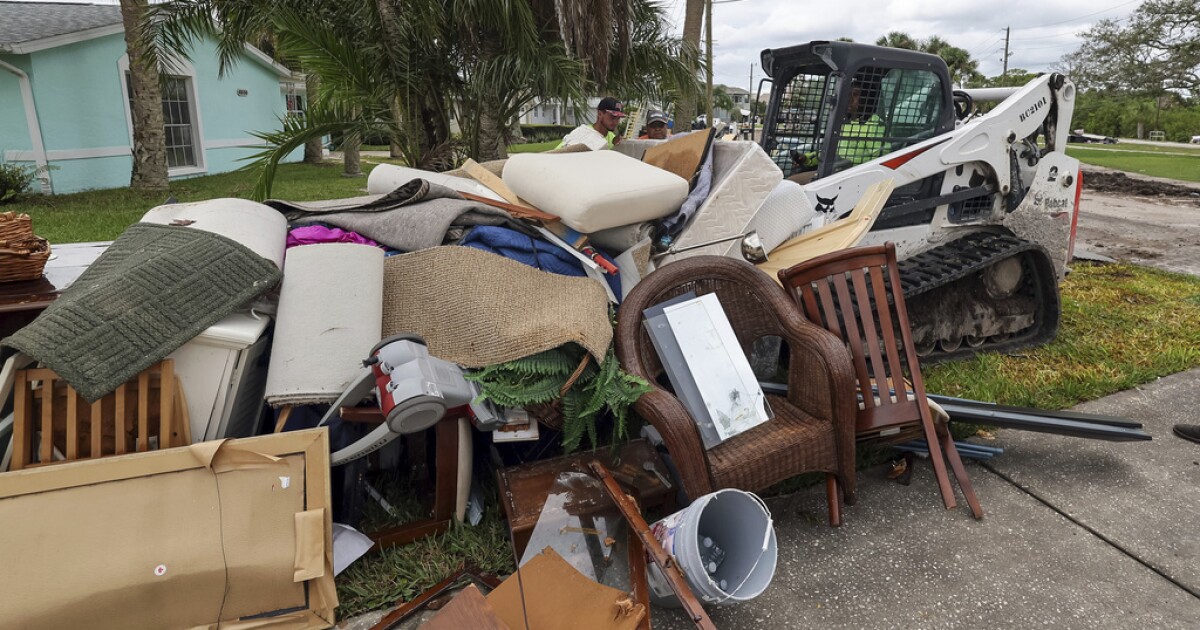[ad_1]
While Florida, Georgia and the Carolinas pick through likely tens of billions of dollars in damage from Helene, another mighty storm is barreling toward Florida, threatening to add to the already staggering cost of this hurricane season.
The damage Helene caused could total $30 billion to $47.5 billion, according to a new estimate from CoreLogic, which previously put the number at $3 billion to $5 billion.
“Whenever you bring heavy rain into Florida or the Gulf Coast, it’s bad enough as it is on flat land, but when you bring it over mountains and steep terrain and it still has the same intensity in terms of rain — not wind, but in terms of rain, you get a lot of problems,” said Alex Tardy, a NOAA meteorologist.
The cost of more extreme natural disasters is adding up. While NOAA says an average year since 1980 has included 8.5 disasters costing a billion dollars or more, last year logged 28. Each of the last four years also logged some of the highest rates of these disasters.
“Legislators need to know that it’s their responsibility to act now,” said Amy Chester, director of the disaster relief advocacy group Rebuild by Design. “It’s not their responsibility to act after a storm. We need to shift a majority of the dollars that come only after communities have suffered to before communities have suffered and rethink our infrastructure.”
RELATED STORY | Helene brings catastrophic flooding, demands huge rescue and cleanup efforts
Severe storms and flooding represented the most dramatic upticks in NOAA’s disaster count last year. Massive tornado outbreaks and wildfires were big contributors. In other words: It’s not just hurricanes.
A report from Rebuild by Design says 91% of congressional districts were hit by at least one federally-declared climate disaster between 2011 and 2023.
“Some of the heat in the Southwest this year might end up being – along with the wildfires — billion dollar disasters as well,” Tardy said.
They affect the overall economy, too. According to a report from Swiss Re Institute, a reinsurance group, the U.S. loses 0.4% of its GDP every year from floods, hurricanes and tropical storms, winter storms and severe thunderstorms. That figure makes the U.S. the world’s second-biggest loser from climate events.
Meanwhile, despite the cost of recovery from Helene, FEMA insists it has what it needs for Hurricane Milton.
“Obviously big disasters like this create longer term needs and across the federal family,” said Keith Turi, FEMA’s acting associate administrator for response and recovery. “We’ll work on those at a later point, but for Helene and for Milton, we have the resources we need.”
But for some local leaders, like Tampa mayor Jane Castor, it’s beyond time for change.
“Helene really woke everyone up,” Castor said. “I can say in my entire time here in the city of Tampa, 64 years, I’ve never seen the damage that we saw with Helene, and Milton is on a whole other plateau.”
Milton will prove another test of our true preparedness for the destructive, expensive disasters of our new reality.
RELATED STORY | Many homeowners say they’re not prepared for financial ramifications of natural disasters
[ad_2]
Source link


